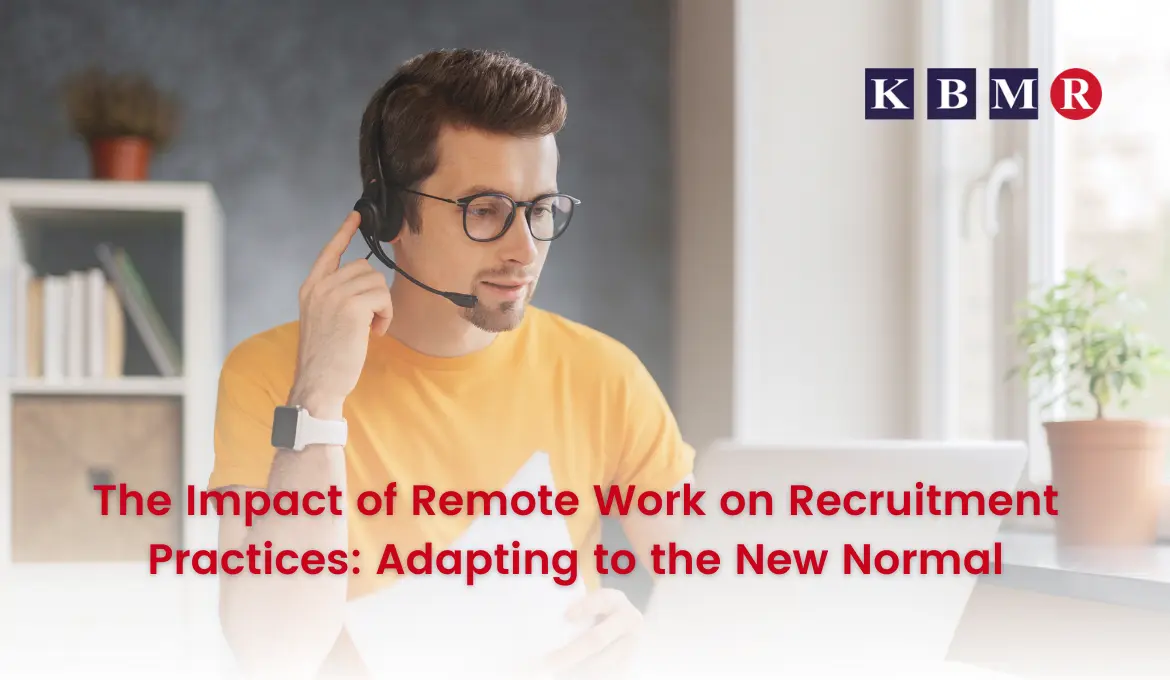The COVID-19 pandemic has significantly shifted how we work, with remote work emerging as the new norm for many organisations worldwide. Recruitment practices have undergone significant transformations as businesses adapt to this paradigm shift.In this blog, we'll explore the impact of remote work on recruitment practices and how organisations adapt to the new normal to attract and retain top talent in a remote-first world.
Remote Working Rise
The COVID-18 pandemic forced organisations across industries to quickly transition to remote work to ensure business continuity and employee safety. What started as a temporary measure has since evolved into a long-term shift towards remote work as organisations recognise the benefits of flexibility, cost savings, and link to a broader talent pool.
Impact on Recruitment Practices
The shift to remote work has had a significant impact on recruitment practices, reshaping traditional hiring processes and strategies in several ways:
-
Virtual Recruitment: With in-person interactions limited by social distancing measures, virtual recruitment has become the new standard. Organisations leverage video conferencing tools, virtual career fairs, and online assessment platforms to remotely conduct interviews, assessments, and onboarding processes. Virtual recruitment allows organisations to reach candidates regardless of geographical location, facilitating access to diverse talent pools.
-
Flexible Work Arrangements: Remote work has opened up opportunities for flexible work arrangements, such as hybrid models that combine remote and in-office work or fully remote positions. Organisations increasingly offer flexible work options to attract and retain top talent, and They recognise the importance of work-life balance and autonomy for employees. Flexible work arrangements enable organisations to tap into talent from different time zones and accommodate diverse scheduling needs.
-
Emphasis on Remote Skills: Remote work requires a unique set of skills, including solid communication, self-discipline, time management, and proficiency in digital collaboration tools. Organisations are placing greater emphasis on assessing candidates' remote work skills during recruitment, looking for individuals who can thrive in a remote work environment. Candidates who demonstrate adaptability, tech-savviness, and a proactive approach to remote work are highly sought after.
-
Enhanced Candidate Experience: Remote recruitment has prompted organisations to rethink their candidate experience strategies, focusing on creating seamless and engaging virtual experiences. From personalised communication and virtual office tours to interactive onboarding sessions and digital welcome kits, organisations are leveraging technology to provide candidates with a positive and memorable experience at every stage of the recruitment process. A positive candidate experience improves employer branding and increases the likelihood of attracting and retaining top talent.
-
Remote Onboarding and Integration: Onboarding new employees in a remote environment presents unique challenges, such as limited face-to-face interaction and potential feelings of isolation. To address these challenges, organisations are implementing remote onboarding programs focusing on building connections, providing comprehensive training, and fostering a sense of belonging from day one. Remote onboarding strategies may include virtual meet-and-greets, mentorship programs, and digital resources to help new hires acclimate to their roles and the organisation's culture.
-
Embracing Diversity and Inclusion: Remote work can level the playing field for disadvantaged groups by eliminating geographical barriers and bias in hiring. Organisations leverage remote work to prioritise diversity and inclusion in their recruitment efforts, actively seeking out diverse candidates and developing inclusive work environments where all employees feel valued and respected. Remote work enables organisations to tap into talent from diverse backgrounds and geographies, fostering a more inclusive workforce.
Adapting to the New Normal
As organisations navigate the shift to remote work and adapt their recruitment practices accordingly, several strategies can help them succeed in the new normal:
-
Invest in Technology: Invest in robust technology infrastructure and digital tools to support remote recruitment processes, including video conferencing platforms, applicant tracking systems, and online assessment tools. Ensure that recruiters and candidates have access to user-friendly and reliable technology for seamless virtual interactions.
-
Prioritise Communication and Transparency: Maintain open and transparent communication with candidates throughout recruitment, providing regular updates and clear expectations. Be proactive in addressing any challenges or concerns related to remote work and ensure that candidates feel supported and informed at every stage.
-
Foster a Remote-Friendly Culture: Create a remote-friendly culture that values flexibility, autonomy, and work-life balance. Provide resources and support for remote employees, such as training on remote work best practices, wellness initiatives, and opportunities for virtual socialisation and team building. Foster a trust and collaboration culture that transcends physical boundaries.
-
Adapt Recruitment Strategies: Tailor recruitment strategies to accommodate remote work arrangements, emphasising remote work skills, flexibility, and adaptability in job descriptions and candidate assessments. It would also help if you considered implementing remote-friendly inter, including. It include virtual interviews and remote skills assessments, to evaluate candidates' suitability for remote roles accurately.
-
Prioritise Employee Wellbeing: Recognise remote work's unique challenges and stressors and prioritise employee wellbeing and mental health. Offer resources and support for maintaining work-life balance, managing stress, and staying connected with colleagues. Encourage regular check-ins and open dialogue about remote work experiences to address concerns and foster a supportive work environment.
Conclusion
The shift to remote work has evolved recruitment practices, prompting organisations to rethink traditional approaches and embrace new strategies for attracting and retaining top talent in a remote-first world. By leveraging virtual recruitment tools, prioritising remote work skills, enhancing candidate experiences, and fostering inclusive remote cultures, organisations can adapt to the new normal and thrive in an increasingly remote workforce. As remote work continues to change, organisations that embrace flexibility, innovation, and inclusivity in their recruitment practices will be established to attract and retain top talent and drive long-term success in the digital age.





